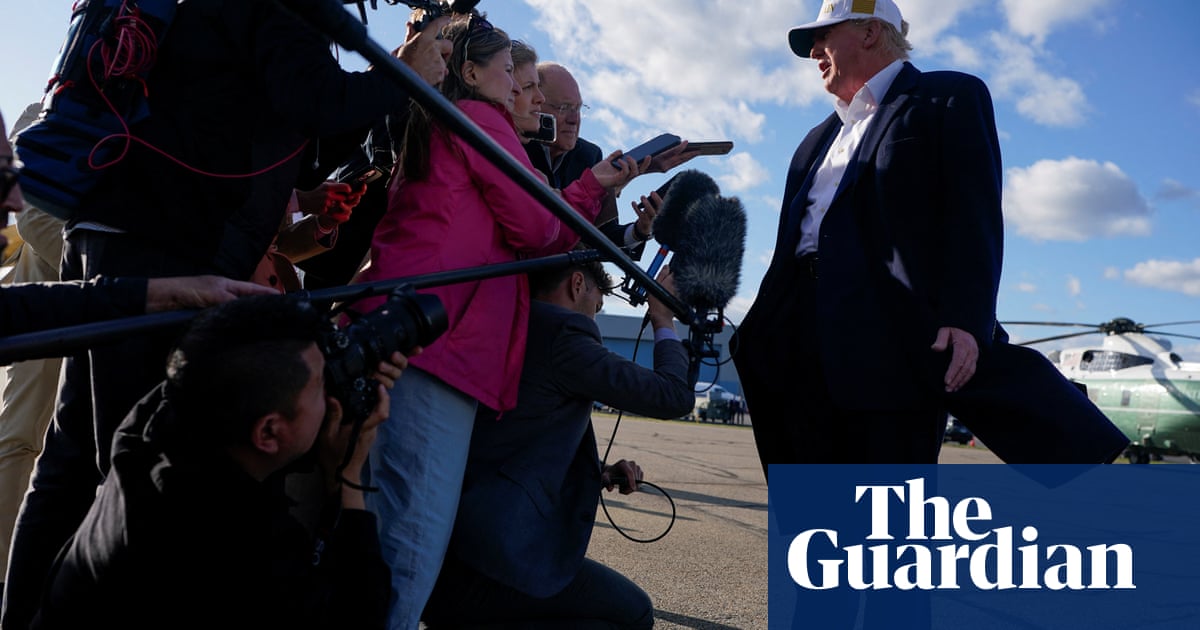Asked to comment on his meeting at the Vatican withVolodymyr Zelenskyy,Donald Trumpon Sunday expressed newfound sympathy for his Ukrainian counterpart, saying he “wants to do something good for his country” and “is working hard”.
Reflecting on his conversation with the Ukrainian presidentin a “beautiful” setting, the US president also said that he was “surprised and disappointed, very disappointed” thatRussiahad bombed Ukraine after discussions between Russia’s president,Vladimir Putin, and Trump’s peace envoy, Steve Witkoff. “I was very disappointed that missiles were flying, by Russia,” the US president said.
Speaking to reporters at an airport in New Jersey, Trump said that Zelenskyy “told me that he needs more weapons, but he’s been saying that for three years”.
Asked what he wants Putin to do, Trump replied: “Well, I want him to stop shooting. Sit down and sign the deal. We have the confines of a deal, I believe, and I want him to sign it and be done with it.”
“Do you trust President Putin?” Trump was asked.
“I’ll let you know in about two weeks,” Trump said. Pressed to elaborate on what he expects to happen in two weeks, Trump evaded the question. “Two weeks or less,” he said, vaguely, “but you know they’re losing a lot of people. We have 3, 4,000 people dying every week.”
Trump also said that his relationship with Zelenskyy was improved by the face-to-face at the Vatican: “Look, it was never bad. We had a little dispute, because I disagreed with something he said, and the cameras were rolling and that was OK with me.”
“Look, he’s in a tough situation, a very tough situation. He’s fighting a much bigger force, much bigger,” Trump added. The president then repeated his frequent false claim that the United States had givenUkraine$350bn to aid its defense from the Russian invasion.
“I see him as calmer,” Trump said, comparing the Zelenskyy he met at the Vatican with the one he confronted in the Oval Office in February. “I think he understands the picture, and I think he wants to make a deal.”
The president also claimed that there had been “a little bit” of progress in trade talks with China, talks that Chinese officials have said are not taking place. “They want to make a deal, obviously,” Trump said. “Now, they’re not doing any business with us, you know, because, not because of them, because of me. Because at 145%, you can’t do business,” he said, in reference to the import tariff rate he imposed this month. “But something’s going to happen, that’s going to be possible.”
Sign up toHeadlines US
Get the most important US headlines and highlights emailed direct to you every morning
after newsletter promotion
Asked about the death by suicide ofVirginia Giuffre, one of the most prominent victims of the disgraced US financier Jeffrey Epstein, Trump said: “That whole situation is very sad, her and others, and so certainly that’s a horrible thing.”
Epstein had socialized with Trump at Mar-a-Lago, andvideo from 1992showed the two men laughing together during a party Trump hosted there.
In legal filings, Giuffre said she had been a teenage spa attendant at Mar-a-Lago – Trump’s club in Palm Beach, Florida – when she was approached in 2000 by Epstein’s girlfriend and later employee, Ghislaine Maxwell.
Giuffre said Maxwell hired her as a masseuse for Epstein, but that the couple effectively made her a sexual servant for not only Epstein but his friends and associates.
In the US, you can call or text theNational Suicide Prevention Lifelineat 988, chat on988lifeline.org, ortext HOMEto 741741 to connect with a crisis counselor. In the UK and Ireland,Samaritanscan be contacted on freephone 116 123, or emailjo@samaritans.orgorjo@samaritans.ie. In Australia, the crisis support serviceLifelineis 13 11 14. Other international helplines can be found atbefrienders.org
